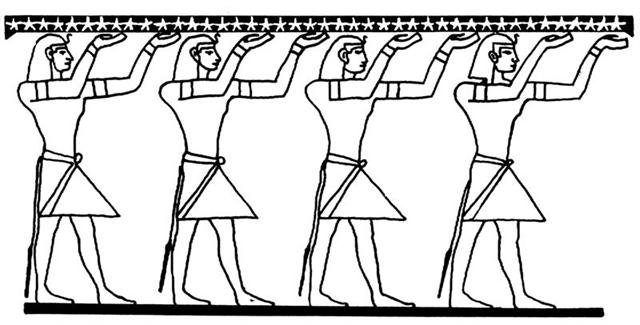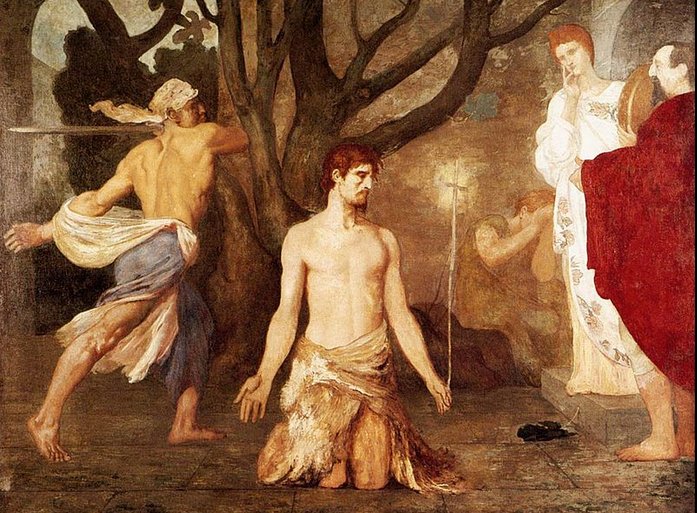Next page:
There
is no light in front
according to
Ca5-22, where 52 *
2 = 104 = 8 * 13 and
where the wing in
front is drawn down,
not allowing light
to enter. Metoro
clearly noticed this
and did not explain
the glyph with his
usual expression
manu rere
('quick bird') but
he simly said te
manu. At the
opposite side of the
year was Alnilam (ε
Orionis - 'a string
of pearls' - in the
center of the Belt)
culminating
at midnight. I have
suggested the
beginning of the C
text was at the
March equiox. 125
days from 0h means
at day 205 (July
24). But in Roman
times the heliacal
day was number 205 -
27 = 178 ('June 27)
= 6 * 29½ + 1:
 |
 |
 |
 |
 |
 |
 |
|
Ca5-17 |
Ca5-18 |
Ca5-19 |
Ca5-20
(125) |
Ca5-21 |
Ca5-22 |
Ca5-23 |
|
hakahagana
te honu |
tagata
moe
hakarava
hia |
ka
moe |
hakapekaga
mai |
te
Rei |
te
manu |
te
henua |
|
ρ Puppis
(122.0),
Heap of
Fuel
(122.1),
ζ
Monocerotis
(122.3),
ψ
Cancri
(122.6),
Regor
(122.7) |
Tegmine
(123.3) |
Al Tarf
(124.3)
Ras
Algethi |
χ Cancri
(125.2),
Bright
Fire
(125.4) |
Avior
(126.4),
φ Cancri
(126.8) |
ο Ursa
Majoris
(127.4) |
Pushya-8 |
|
υ Cancri
(128.1),
θ CANCRI
(128.2),
η Cancri
(128.5) |
|
Shang
Wei
(305.2),
θ
Sagittae
(305.4),
Tseen
Foo
(305.6),
ξ
Capricorni
(305.8) |
Tso Ke
(306.3) |
Gredi
(307.2),
σ
Capricorni
(307.5),
Alshat
(307.9) |
Al
Sa’d al
Dhabih-20
/
Ox /
Herd
Boy-9 |
Okul
(309.6),
Bos
(309.9)
Arneb
|
ο
Capricorni
(310.2),
θ Cephei
(310.5)
Alnilam
|
Rotten
Melon, φ
Pavonis
(311.2),
η
Delphini
(311.4),
ζ
Delphini,
ρ
Pavonis
(311.7)
Phakt
|
|
DABIH
(308.0),
κ
Sagittarii
(308.1),
Sadir
(308.4),
Peacock
(308.7) |
Culminating Alnilam
had culminating
Arneb (α
Leporis) at
one side and
culminating Phakt (α
Columbae) at
the other. But
reasonably also
Mintaka (δ
Orionis)
respectively Alnitak
(ζ Orionis), the 1st
and 3rd stars in the
Belt, were
culminating before
respectively after
Alnilam. Though
Allen has no
information
regarding their
culminating dates.
 |
 |
 |
 |
|
Ca5-24 |
Ca5-25 |
Ca5-26 |
Ca5-27 |
|
tuu
te rima
i ruga |
etoru
kahi |
|
Āshleshā-9
/
Willow-24 |
Al
Nathrah-6 |
Extended
Net-26a |
ι Cancri
(132.0),
ρ Hydrae
(132.4) |
|
π¹ Ursa
Majoris,
δ HYDRAE (129.6),
Al
Minhar
al Shujā,
Museida
(129.9)
Ras
Alhague |
BEEHIVE
& M44
(130.4),
Xestus
(130.5),
Ascellus
Borealis
(130.9) |
η Hydrae
(131.0),
Ascellus
Australis
(131.4),
Koo She
(131.6),
ε HYDRAE
(131.9) |
|
Rotanev,
ι
Delphini
(312.3),
τ
Capricorni
(312.6),
κ
Delphini
(312.7),
SVALOCIN,
υ
Capricorni,
υ
Pavonis
(312.8) |
Deneb
Cygni
(313.5),
β
Pavonis
(313.6),
δ
Delphini
(313.8) |
Al Sa’d
al
Bula'-21
/
Dhanishta-24
/
Girl-10 |
Baten
Algiedi
(315.8) |
|
Yue
(314.3),
Gienah
Cygni, η
Cephei
(314.5),
γ
Delphini
(314.6),
σ
Pavonis
(314.7),
ALBALI
(314.8)
Betelgeuze |
 |
 |
 |
 |
|
Ca5-28 |
Ca5-29 |
Ca5-30 |
Ca5-31
(136) |
|
e
manu |
te
kahi |
te
henua |
haro
rima i
ruga |
|
no star
listed
(133) |
ζ Hydrae
(134.1),
ρ Cancri
(134.2),
ο Cancri
(134.6) |
Acubens,
Talitha
Borealis
(135.0),
σ Cancri
(135.2),
ρ Ursa
Majoris
(135.6) |
ν Cancri
(136.0),
Talitha
Australis
(136.1),
ω Hydrae
(136.8) |
|
μ
Aquarii
(316.0) |
ε
Equulei
(317.8) |
no star
listed
(318) |
21h
(319.6) |
|
Armus
(319.0),
Dorsum
(319.3),
Tsoo
(319.7) |
 |
 |
 |
 |
 |
 |
 |
|
Ca5-32
(137) |
Ca5-33 |
Ca5-34 |
Ca5-35 |
Ca6-1 |
Ca6-2 |
Ca6-3 |
|
e
vaha
noho
ragi |
erua ahi |
i te
hau tea |
Erua hau
tea |
i te
henua i
te rima |
|
9h
(137.0) |
no star
listed
(138) |
π Cancri
(139.2),
Miaplacidus
(139.3),
Tureis
(139.8) |
no star
listed
(140) |
Markab
Velorum
(141.5),
Al
Minhar
al Asad
(141.6) |
Star-25
ANA-HEU-HEU-PO |
Al
Tarf-7 |
|
σ¹ Ursa
Majoris
(137.0),
κ Cancri
(137.3),
τ Cancri
(137.4),
Alsuhail
(137.5),
σ² Ursa
Majoris
(137.6),
τ Ursa
Majoris
(137.7),
ξ Cancri
(137.8) |
ALPHARD
(142.3),
ω Leonis
(142.6),
τ¹
Hydrae
(142.7) |
ψ
Velorum
(143.3),
ALTERF,
τ²
Hydrae
(143.4),
ξ Leonis
(143.5) |
|
χ
Capricorni
(320.0),
ν
Aquarii
(320.3),
γ
Equulei
(320.6),
ο
Pavonis
(320.8) |
δ
Equulei
(321.7),
φ
Capricorni
(321.8) |
Kitalpha
(322.0),
Alderamin
(322.9) |
Dai
(323.5),
β
Equulei
(323.8) |
γ
Pavonis
(324.1),
Yan
(324.6) |
Al
Sa'd al
Su'ud-22
/
Emptiness-11 |
no star
listed
(326) |
|
Tsin
(325.2),
Alphirk
(325.7),
SADALSUD,
ξ Gruis
(325.9) |
Raised up arms (haro
rima i ruga)
suggest 'sky
proppers', 4 of
them. Then there
comes an opening
(vaha) in
day 137 counted
from the
beginning of the
text, an
'opening for
dwelling in the
sky' (vaha
noho ragi).

My purpose with
comparing the G
text with the C
text is to state
that with 'twin
eyes' (twin half
years) the signs
described by the
stars in the sky
roof will be
similar at
opposite sides
of the year.
Rising the
daytime sky roof
for Pollux in
the morning will
be similar to
rising the
nighttime sky
roof for Castor
in the evening.
Except that the
construction for
Castor (the left
eye of the Sun)
must be a ship
whereas the
construction for
Pollux (the
right eye of the
Sun) will be on
firm land.
The stern of the
ship of Castor
ought to be
described by
Argo Navis down
in the
southwest, in
winter-summer (toga-hora).
The house of
Pollux should be
higher up. When
Argo Navis was
beginning to be
visible in the
evening, then
the Sun should
be at the
beginning of the
house of Pollux.
The first star
in Argo Navis
was Canopus and
close to the
Full Moon
Canopus should
therefore
signify a season
of light
(summer-winter)
for people
living south of
the equator:
 |
 |
 |
 |
 |
|
Ga1-30 |
Ga2-1 |
Ga2-2 |
Ga2-3 |
Ga2-4 |
|
Furud
(94.9) |
Well-22 |
no
star
listed
(96) |
β
Monocerotis,
ν
Gemini
(97.0) |
no
star
listed
(98) |
|
δ
Columbae
(95.2),
TEJAT
POSTERIOR,
Mirzam
(95.4),
CANOPUS
(95.6),
ε
Monocerotis
(95.7),
ψ1
Aurigae
(95.9) |
|
June
23 |
ST
JOHN'S
EVE |
25 |
26
(177) |
27 |
|
ºJune
19 |
20
(*91) |
SOLSTICE |
22 |
23 |
|
'May
27 |
28
(*68) |
29 |
30
(*70) |
31 |
|
'Vaitu
Potu
27 |
28
(148) |
29 |
30
(150) |
31 |
|
"May
13 |
14
(*54) |
15
(*55) |
16
(136) |
17 |
|
Purva
Ashadha-20 |
Kaus
Borealis
(279.3) |
ν
Pavonis
(280.4),
κ
Cor.
Austr.
(280.9) |
Abhijit-22 |
|
KAUS
MEDIUS,
κ
Lyrae
(277.5),
Tung
Hae
(277.7) |
KAUS
AUSTRALIS
(278.3),
ξ
Pavonis
(278.4),
Al
Athfar
(278.6) |
θ
Cor.
Austr.
(281.0),
VEGA
(281.8) |
|
Dec
23
(357) |
CHRISTMAS
EVE |
25 |
26
(360) |
27 |
|
ºDec
19
(*273) |
20 |
SOLSTICE |
22 |
23
(357) |
|
'Nov
26
(*250) |
27 |
28 |
29 |
30
(*254) |
|
'Ko
Ruti
26 |
27 |
28 |
29
(333) |
30 |
|
"Nov
12
(*236) |
13 |
14 |
15 |
16
(320) |
"The evening of
23 June, St.
John's Eve,
is the eve of
celebration
before the Feast
Day of Saint
John the
Baptist. The
Gospel of Luke
(Luke 1:36,
56-57) states
that John was
born about six
months before
Jesus;
therefore, the
feast of John
the Baptist was
fixed on 24
June, six months
before Christmas
Eve."
(Wikipedia)
The baptist
surely
represented the
watery side.

|












